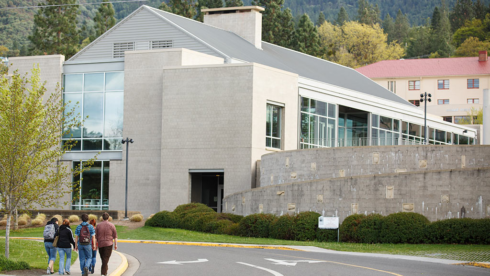Biology professor explains why global warming skeptics should be listened to
More than 100 students and community members gathered in the Meese Auditorium of the Southern Oregon University Art Building on April 21 to hear Dr. John Roden give a lecture on arguments against climate change.
“Whenever science is influenced by politics, industry, advocacy groups, etc., I believe science loses it’s objectivity and some of it’s integrity,” said Roden. “That’s the problem with this field is that there are so many pressures from all sides.”
Roden, a professor of Biology at SOU, presented several arguments against global warming, saying there were qualified skeptics who had legitimate arguments opposing the conventional theory of climate change.
Roden also stressed that though the arguments of the skeptics may not necessarily be true, they should still be heard.
“I think of climate change as a three legged stool,” said Roden. “And the thing about a three legged stool is that if you remove on of the legs, it falls apart.”
Roden asserts that the theory of climate change has three premises, or “legs,” – first that the earth is actually warming, the second that it is caused by humans, and the third that warming is bad.
Roden claimed that there was disagreement as to whether the earth was actually warming, saying scientists drew different conclusions about Earth’s past climate depending on the data they used.
Roden explained that there are two types of data sets that scientists use to determine the climate in Earth’s past – the first based on analysis of oxygen isotopes in tree rings and the second on analysis of ice cores from Greenland and Antarctica.
Roden likened these two data sets to “comparing apples and oranges,” because the tree rings can only provide a maximum of 2,000 years of climate history, while the ice cores go much further back.
Roden went on to say that there is debate over the impact of humans on Earth’s climate, once again due to the fact that the conclusions scientists come to depend on the data they use.
“Humans are to blame,” said Roden. “This is the consensus being put forward. Consensus is only invoked when there are significant disagreements. In other words, consensus is only invoked when there isn’t consensus.”
Finally, Roden questioned whether climate change is bad.
“Some argue that warming will be beneficial,” said Roden. “At least for human societies in the past, warming has always been better than cooling.”
Roden concluded his lecture by saying that while there are valid arguments against climate change, they aren’t necessarily true.
“When I present the arguments of the skeptics I’m not saying they’re right,” said Roden. “I’m not saying they’re true.”
“Climate change and potential mitigation efforts have considerable consequences for us individually, socially, and ecologically,” said Roden. “This is a big thing.”


